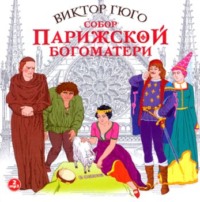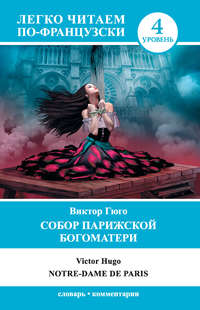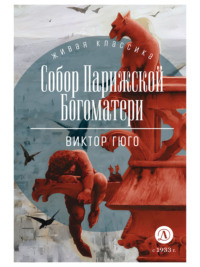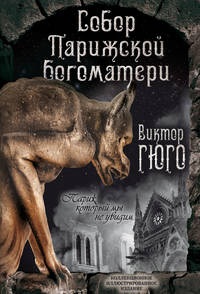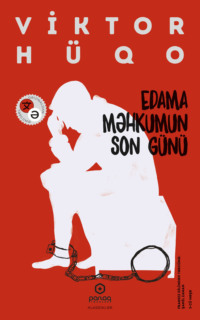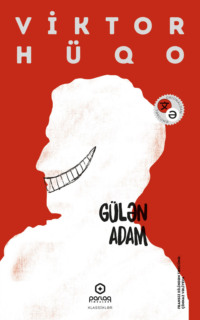 полная версия
полная версияLes Misérables
CHAPTER IV – BEGINNING OF A GREAT MALADY
On the following day, at the accustomed hour, Marius drew from his wardrobe his new coat, his new trousers, his new hat, and his new boots; he clothed himself in this complete panoply, put on his gloves, a tremendous luxury, and set off for the Luxembourg.
On the way thither, he encountered Courfeyrac, and pretended not to see him. Courfeyrac, on his return home, said to his friends: —
“I have just met Marius’ new hat and new coat, with Marius inside them. He was going to pass an examination, no doubt. He looked utterly stupid.”
On arriving at the Luxembourg, Marius made the tour of the fountain basin, and stared at the swans; then he remained for a long time in contemplation before a statue whose head was perfectly black with mould, and one of whose hips was missing. Near the basin there was a bourgeois forty years of age, with a prominent stomach, who was holding by the hand a little urchin of five, and saying to him: “Shun excess, my son, keep at an equal distance from despotism and from anarchy.” Marius listened to this bourgeois. Then he made the circuit of the basin once more. At last he directed his course towards “his alley,” slowly, and as if with regret. One would have said that he was both forced to go there and withheld from doing so. He did not perceive it himself, and thought that he was doing as he always did.
On turning into the walk, he saw M. Leblanc and the young girl at the other end, “on their bench.” He buttoned his coat up to the very top, pulled it down on his body so that there might be no wrinkles, examined, with a certain complaisance, the lustrous gleams of his trousers, and marched on the bench. This march savored of an attack, and certainly of a desire for conquest. So I say that he marched on the bench, as I should say: “Hannibal marched on Rome.”
However, all his movements were purely mechanical, and he had interrupted none of the habitual preoccupations of his mind and labors. At that moment, he was thinking that the Manuel du Baccalauréat was a stupid book, and that it must have been drawn up by rare idiots, to allow of three tragedies of Racine and only one comedy of Molière being analyzed therein as masterpieces of the human mind. There was a piercing whistling going on in his ears. As he approached the bench, he held fast to the folds in his coat, and fixed his eyes on the young girl. It seemed to him that she filled the entire extremity of the alley with a vague blue light.
In proportion as he drew near, his pace slackened more and more. On arriving at some little distance from the bench, and long before he had reached the end of the walk, he halted, and could not explain to himself why he retraced his steps. He did not even say to himself that he would not go as far as the end. It was only with difficulty that the young girl could have perceived him in the distance and noted his fine appearance in his new clothes. Nevertheless, he held himself very erect, in case any one should be looking at him from behind.
He attained the opposite end, then came back, and this time he approached a little nearer to the bench. He even got to within three intervals of trees, but there he felt an indescribable impossibility of proceeding further, and he hesitated. He thought he saw the young girl’s face bending towards him. But he exerted a manly and violent effort, subdued his hesitation, and walked straight ahead. A few seconds later, he rushed in front of the bench, erect and firm, reddening to the very ears, without daring to cast a glance either to the right or to the left, with his hand thrust into his coat like a statesman. At the moment when he passed, – under the cannon of the place, – he felt his heart beat wildly. As on the preceding day, she wore her damask gown and her crape bonnet. He heard an ineffable voice, which must have been “her voice.” She was talking tranquilly. She was very pretty. He felt it, although he made no attempt to see her. “She could not, however,” he thought, “help feeling esteem and consideration for me, if she only knew that I am the veritable author of the dissertation on Marcos Obrégon de la Ronde, which M. François de Neufchâteau put, as though it were his own, at the head of his edition of Gil Blas.” He went beyond the bench as far as the extremity of the walk, which was very near, then turned on his heel and passed once more in front of the lovely girl. This time, he was very pale. Moreover, all his emotions were disagreeable. As he went further from the bench and the young girl, and while his back was turned to her, he fancied that she was gazing after him, and that made him stumble.
He did not attempt to approach the bench again; he halted near the middle of the walk, and there, a thing which he never did, he sat down, and reflecting in the most profoundly indistinct depths of his spirit, that after all, it was hard that persons whose white bonnet and black gown he admired should be absolutely insensible to his splendid trousers and his new coat.
At the expiration of a quarter of an hour, he rose, as though he were on the point of again beginning his march towards that bench which was surrounded by an aureole. But he remained standing there, motionless. For the first time in fifteen months, he said to himself that that gentleman who sat there every day with his daughter, had, on his side, noticed him, and probably considered his assiduity singular.
For the first time, also, he was conscious of some irreverence in designating that stranger, even in his secret thoughts, by the sobriquet of M. Leblanc.
He stood thus for several minutes, with drooping head, tracing figures in the sand, with the cane which he held in his hand.
Then he turned abruptly in the direction opposite to the bench, to M. Leblanc and his daughter, and went home.
That day he forgot to dine. At eight o’clock in the evening he perceived this fact, and as it was too late to go down to the Rue Saint-Jacques, he said: “Never mind!” and ate a bit of bread.
He did not go to bed until he had brushed his coat and folded it up with great care.
CHAPTER V – DIVERS CLAPS OF THUNDER FALL ON MA’AM BOUGON
On the following day, Ma’am Bougon, as Courfeyrac styled the old portress-principal-tenant, housekeeper of the Gorbeau hovel, Ma’am Bougon, whose name was, in reality, Madame Burgon, as we have found out, but this iconoclast, Courfeyrac, respected nothing, – Ma’am Bougon observed, with stupefaction, that M. Marius was going out again in his new coat.
He went to the Luxembourg again, but he did not proceed further than his bench midway of the alley. He seated himself there, as on the preceding day, surveying from a distance, and clearly making out, the white bonnet, the black dress, and above all, that blue light. He did not stir from it, and only went home when the gates of the Luxembourg closed. He did not see M. Leblanc and his daughter retire. He concluded that they had quitted the garden by the gate on the Rue de l’Ouest. Later on, several weeks afterwards, when he came to think it over, he could never recall where he had dined that evening.
On the following day, which was the third, Ma’am Bougon was thunderstruck. Marius went out in his new coat. “Three days in succession!” she exclaimed.
She tried to follow him, but Marius walked briskly, and with immense strides; it was a hippopotamus undertaking the pursuit of a chamois. She lost sight of him in two minutes, and returned breathless, three-quarters choked with asthma, and furious. “If there is any sense,” she growled, “in putting on one’s best clothes every day, and making people run like this!”
Marius betook himself to the Luxembourg.
The young girl was there with M. Leblanc. Marius approached as near as he could, pretending to be busy reading a book, but he halted afar off, then returned and seated himself on his bench, where he spent four hours in watching the house-sparrows who were skipping about the walk, and who produced on him the impression that they were making sport of him.
A fortnight passed thus. Marius went to the Luxembourg no longer for the sake of strolling there, but to seat himself always in the same spot, and that without knowing why. Once arrived there, he did not stir. He put on his new coat every morning, for the purpose of not showing himself, and he began all over again on the morrow.
She was decidedly a marvellous beauty. The only remark approaching a criticism, that could be made, was, that the contradiction between her gaze, which was melancholy, and her smile, which was merry, gave a rather wild effect to her face, which sometimes caused this sweet countenance to become strange without ceasing to be charming.
CHAPTER VI – TAKEN PRISONER
On one of the last days of the second week, Marius was seated on his bench, as usual, holding in his hand an open book, of which he had not turned a page for the last two hours. All at once he started. An event was taking place at the other extremity of the walk. Leblanc and his daughter had just left their seat, and the daughter had taken her father’s arm, and both were advancing slowly, towards the middle of the alley where Marius was. Marius closed his book, then opened it again, then forced himself to read; he trembled; the aureole was coming straight towards him. “Ah! good Heavens!” thought he, “I shall not have time to strike an attitude.” Still the white-haired man and the girl advanced. It seemed to him that this lasted for a century, and that it was but a second. “What are they coming in this direction for?” he asked himself. “What! She will pass here? Her feet will tread this sand, this walk, two paces from me?” He was utterly upset, he would have liked to be very handsome, he would have liked to own the cross. He heard the soft and measured sound of their approaching footsteps. He imagined that M. Leblanc was darting angry glances at him. “Is that gentleman going to address me?” he thought to himself. He dropped his head; when he raised it again, they were very near him. The young girl passed, and as she passed, she glanced at him. She gazed steadily at him, with a pensive sweetness which thrilled Marius from head to foot. It seemed to him that she was reproaching him for having allowed so long a time to elapse without coming as far as her, and that she was saying to him: “I am coming myself.” Marius was dazzled by those eyes fraught with rays and abysses.
He felt his brain on fire. She had come to him, what joy! And then, how she had looked at him! She appeared to him more beautiful than he had ever seen her yet. Beautiful with a beauty which was wholly feminine and angelic, with a complete beauty which would have made Petrarch sing and Dante kneel. It seemed to him that he was floating free in the azure heavens. At the same time, he was horribly vexed because there was dust on his boots.
He thought he felt sure that she had looked at his boots too.
He followed her with his eyes until she disappeared. Then he started up and walked about the Luxembourg garden like a madman. It is possible that, at times, he laughed to himself and talked aloud. He was so dreamy when he came near the children’s nurses, that each one of them thought him in love with her.
He quitted the Luxembourg, hoping to find her again in the street.
He encountered Courfeyrac under the arcades of the Odéon, and said to him: “Come and dine with me.” They went off to Rousseau’s and spent six francs. Marius ate like an ogre. He gave the waiter six sous. At dessert, he said to Courfeyrac. “Have you read the paper? What a fine discourse Audry de Puyraveau delivered!”
He was desperately in love.
After dinner, he said to Courfeyrac: “I will treat you to the play.” They went to the Porte-Sainte-Martin to see Frédérick in l’Auberge des Adrets. Marius was enormously amused.
At the same time, he had a redoubled attack of shyness. On emerging from the theatre, he refused to look at the garter of a modiste who was stepping across a gutter, and Courfeyrac, who said: “I should like to put that woman in my collection,” almost horrified him.
Courfeyrac invited him to breakfast at the Café Voltaire on the following morning. Marius went thither, and ate even more than on the preceding evening. He was very thoughtful and very merry. One would have said that he was taking advantage of every occasion to laugh uproariously. He tenderly embraced some man or other from the provinces, who was presented to him. A circle of students formed round the table, and they spoke of the nonsense paid for by the State which was uttered from the rostrum in the Sorbonne, then the conversation fell upon the faults and omissions in Guicherat’s dictionaries and grammars. Marius interrupted the discussion to exclaim: “But it is very agreeable, all the same to have the cross!”
“That’s queer!” whispered Courfeyrac to Jean Prouvaire.
“No,” responded Prouvaire, “that’s serious.”
It was serious; in fact, Marius had reached that first violent and charming hour with which grand passions begin.
A glance had wrought all this.
When the mine is charged, when the conflagration is ready, nothing is more simple. A glance is a spark.
It was all over with him. Marius loved a woman. His fate was entering the unknown.
The glance of women resembles certain combinations of wheels, which are tranquil in appearance yet formidable. You pass close to them every day, peaceably and with impunity, and without a suspicion of anything. A moment arrives when you forget that the thing is there. You go and come, dream, speak, laugh. All at once you feel yourself clutched; all is over. The wheels hold you fast, the glance has ensnared you. It has caught you, no matter where or how, by some portion of your thought which was fluttering loose, by some distraction which had attacked you. You are lost. The whole of you passes into it. A chain of mysterious forces takes possession of you. You struggle in vain; no more human succor is possible. You go on falling from gearing to gearing, from agony to agony, from torture to torture, you, your mind, your fortune, your future, your soul; and, according to whether you are in the power of a wicked creature, or of a noble heart, you will not escape from this terrifying machine otherwise than disfigured with shame, or transfigured by passion.
CHAPTER VII – ADVENTURES OF THE LETTER U DELIVERED OVER TO CONJECTURES
Isolation, detachment, from everything, pride, independence, the taste of nature, the absence of daily and material activity, the life within himself, the secret conflicts of chastity, a benevolent ecstasy towards all creation, had prepared Marius for this possession which is called passion. His worship of his father had gradually become a religion, and, like all religions, it had retreated to the depths of his soul. Something was required in the foreground. Love came.
A full month elapsed, during which Marius went every day to the Luxembourg. When the hour arrived, nothing could hold him back. – “He is on duty,” said Courfeyrac. Marius lived in a state of delight. It is certain that the young girl did look at him.
He had finally grown bold, and approached the bench. Still, he did not pass in front of it any more, in obedience to the instinct of timidity and to the instinct of prudence common to lovers. He considered it better not to attract “the attention of the father.” He combined his stations behind the trees and the pedestals of the statues with a profound diplomacy, so that he might be seen as much as possible by the young girl and as little as possible by the old gentleman. Sometimes, he remained motionless by the half-hour together in the shade of a Leonidas or a Spartacus, holding in his hand a book, above which his eyes, gently raised, sought the beautiful girl, and she, on her side, turned her charming profile towards him with a vague smile. While conversing in the most natural and tranquil manner in the world with the white-haired man, she bent upon Marius all the reveries of a virginal and passionate eye. Ancient and time-honored manœuvre which Eve understood from the very first day of the world, and which every woman understands from the very first day of her life! her mouth replied to one, and her glance replied to another.
It must be supposed, that M. Leblanc finally noticed something, for often, when Marius arrived, he rose and began to walk about. He had abandoned their accustomed place and had adopted the bench by the Gladiator, near the other end of the walk, as though with the object of seeing whether Marius would pursue them thither. Marius did not understand, and committed this error. “The father” began to grow inexact, and no longer brought “his daughter” every day. Sometimes, he came alone. Then Marius did not stay. Another blunder.
Marius paid no heed to these symptoms. From the phase of timidity, he had passed, by a natural and fatal progress, to the phase of blindness. His love increased. He dreamed of it every night. And then, an unexpected bliss had happened to him, oil on the fire, a redoubling of the shadows over his eyes. One evening, at dusk, he had found, on the bench which “M. Leblanc and his daughter” had just quitted, a handkerchief, a very simple handkerchief, without embroidery, but white, and fine, and which seemed to him to exhale ineffable perfume. He seized it with rapture. This handkerchief was marked with the letters U. F. Marius knew nothing about this beautiful child, – neither her family name, her Christian name nor her abode; these two letters were the first thing of her that he had gained possession of, adorable initials, upon which he immediately began to construct his scaffolding. U was evidently the Christian name. “Ursule!” he thought, “what a delicious name!” He kissed the handkerchief, drank it in, placed it on his heart, on his flesh, during the day, and at night, laid it beneath his lips that he might fall asleep on it.
“I feel that her whole soul lies within it!” he exclaimed.
This handkerchief belonged to the old gentleman, who had simply let it fall from his pocket.
In the days which followed the finding of this treasure, he only displayed himself at the Luxembourg in the act of kissing the handkerchief and laying it on his heart. The beautiful child understood nothing of all this, and signified it to him by imperceptible signs.
“O modesty!” said Marius.
CHAPTER VIII – THE VETERANS THEMSELVES CAN BE HAPPY
Since we have pronounced the word modesty, and since we conceal nothing, we ought to say that once, nevertheless, in spite of his ecstasies, “his Ursule” caused him very serious grief. It was on one of the days when she persuaded M. Leblanc to leave the bench and stroll along the walk. A brisk May breeze was blowing, which swayed the crests of the plaintain-trees. The father and daughter, arm in arm, had just passed Marius’ bench. Marius had risen to his feet behind them, and was following them with his eyes, as was fitting in the desperate situation of his soul.
All at once, a gust of wind, more merry than the rest, and probably charged with performing the affairs of Springtime, swept down from the nursery, flung itself on the alley, enveloped the young girl in a delicious shiver, worthy of Virgil’s nymphs, and the fawns of Theocritus, and lifted her dress, the robe more sacred than that of Isis, almost to the height of her garter. A leg of exquisite shape appeared. Marius saw it. He was exasperated and furious.
The young girl had hastily thrust down her dress, with a divinely troubled motion, but he was nonetheless angry for all that. He was alone in the alley, it is true. But there might have been some one there. And what if there had been some one there! Can any one comprehend such a thing? What she had just done is horrible! – Alas, the poor child had done nothing; there had been but one culprit, the wind; but Marius, in whom quivered the Bartholo who exists in Cherubin, was determined to be vexed, and was jealous of his own shadow. It is thus, in fact, that the harsh and capricious jealousy of the flesh awakens in the human heart, and takes possession of it, even without any right. Moreover, setting aside even that jealousy, the sight of that charming leg had contained nothing agreeable for him; the white stocking of the first woman he chanced to meet would have afforded him more pleasure.
When “his Ursule,” after having reached the end of the walk, retraced her steps with M. Leblanc, and passed in front of the bench on which Marius had seated himself once more, Marius darted a sullen and ferocious glance at her. The young girl gave way to that slight straightening up with a backward movement, accompanied by a raising of the eyelids, which signifies: “Well, what is the matter?”
This was “their first quarrel.”
Marius had hardly made this scene at her with his eyes, when some one crossed the walk. It was a veteran, very much bent, extremely wrinkled, and pale, in a uniform of the Louis XV. pattern, bearing on his breast the little oval plaque of red cloth, with the crossed swords, the soldier’s cross of Saint-Louis, and adorned, in addition, with a coat-sleeve, which had no arm within it, with a silver chin and a wooden leg. Marius thought he perceived that this man had an extremely well satisfied air. It even struck him that the aged cynic, as he hobbled along past him, addressed to him a very fraternal and very merry wink, as though some chance had created an understanding between them, and as though they had shared some piece of good luck together. What did that relic of Mars mean by being so contented? What had passed between that wooden leg and the other? Marius reached a paroxysm of jealousy. – “Perhaps he was there!” he said to himself; “perhaps he saw!” – And he felt a desire to exterminate the veteran.
With the aid of time, all points grow dull. Marius’ wrath against “Ursule,” just and legitimate as it was, passed off. He finally pardoned her; but this cost him a great effort; he sulked for three days.
Nevertheless, in spite of all this, and because of all this, his passion augmented and grew to madness.
CHAPTER IX – ECLIPSE
The reader has just seen how Marius discovered, or thought that he discovered, that She was named Ursule.
Appetite grows with loving. To know that her name was Ursule was a great deal; it was very little. In three or four weeks, Marius had devoured this bliss. He wanted another. He wanted to know where she lived.
He had committed his first blunder, by falling into the ambush of the bench by the Gladiator. He had committed a second, by not remaining at the Luxembourg when M. Leblanc came thither alone. He now committed a third, and an immense one. He followed “Ursule.”
She lived in the Rue de l’Ouest, in the most unfrequented spot, in a new, three-story house, of modest appearance.
From that moment forth, Marius added to his happiness of seeing her at the Luxembourg the happiness of following her home.
His hunger was increasing. He knew her first name, at least, a charming name, a genuine woman’s name; he knew where she lived; he wanted to know who she was.
One evening, after he had followed them to their dwelling, and had seen them disappear through the carriage gate, he entered in their train and said boldly to the porter: —
“Is that the gentleman who lives on the first floor, who has just come in?”
“No,” replied the porter. “He is the gentleman on the third floor.”
Another step gained. This success emboldened Marius.
“On the front?” he asked.
“Parbleu!” said the porter, “the house is only built on the street.”
“And what is that gentleman’s business?” began Marius again.
“He is a gentleman of property, sir. A very kind man who does good to the unfortunate, though not rich himself.”
“What is his name?” resumed Marius.
The porter raised his head and said: —
“Are you a police spy, sir?”
Marius went off quite abashed, but delighted. He was getting on.
“Good,” thought he, “I know that her name is Ursule, that she is the daughter of a gentleman who lives on his income, and that she lives there, on the third floor, in the Rue de l’Ouest.”
On the following day, M. Leblanc and his daughter made only a very brief stay in the Luxembourg; they went away while it was still broad daylight. Marius followed them to the Rue de l’Ouest, as he had taken up the habit of doing. On arriving at the carriage entrance M. Leblanc made his daughter pass in first, then paused, before crossing the threshold, and stared intently at Marius.


